M Blu-ray Movie
HomeM Blu-ray Movie 
M - Eine Stadt sucht einen Mörder / German and English VersionsCriterion | 1931 | 1 Movie, 2 Cuts | 110 min | Not rated | May 11, 2010
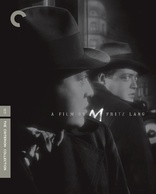
Movie rating
8.6 | / 10 |
Blu-ray rating
| Users | 4.8 | |
| Reviewer | 4.5 | |
| Overall | 4.5 |
Overview
M (1931)
The mob sets out to catch a child killer whose crimes are attracting too much police attention.
Starring: Peter Lorre, Ellen Widmann, Inge Landgut, Otto Wernicke, Theodor LoosDirector: Fritz Lang
| Drama | Uncertain |
| Foreign | Uncertain |
| Psychological thriller | Uncertain |
| Crime | Uncertain |
| Thriller | Uncertain |
Specifications
Video
Video codec: MPEG-4 AVC
Video resolution: 1080p
Aspect ratio: 1.19:1
Original aspect ratio: 1.2:1
Audio
German: LPCM Mono (48kHz, 24-bit)
English: Dolby Digital Mono (192 kbps)
BDInfo
Subtitles
English
Discs
50GB Blu-ray Disc
Single disc (1 BD)
Playback
Region A (locked)
Review
Rating summary
| Movie | 4.5 | |
| Video | 4.5 | |
| Audio | 4.5 | |
| Extras | 4.5 | |
| Overall | 4.5 |
M Blu-ray Movie Review
Reviewed by Dr. Svet Atanasov April 27, 2010Fritz Lang's "M" (1931) arrives on Blu-ray courtesy of Criterion. The supplemental features on the disc include an audio commentary with University of California at Berkeley professor Anton Kaes and Harvard University professor of German Eric Rentschler; director William Friedkin's film "Conversation with Fritz Lang" (1975); the documentary "A Physical History of M"; director Claude Chabrol's short "M le maudit"; an interview with Harold Nebenzal, son of producer Seymor Nebenzal; "Paul Falkenberg's Classroom Tapes"; stills gallery; and the English-language version of "M". The disc also arrives with a 34-page illustrated booklet. In German, with optional English subtitles. Region-A "locked".
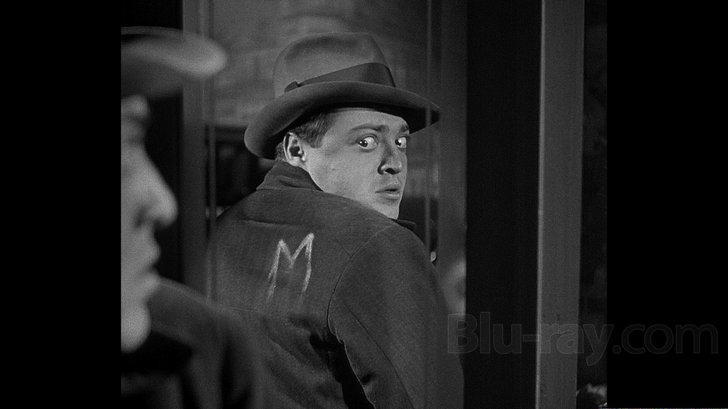
Marked
A child murderer is on the loose in an unnamed German city. The police, under the leadership of Inspector Lohmann (Otto Wernicke, Gold in New Frisco), ask the public for assistance - any tips or leads that might help them identify the murderer are welcome. In the meantime, frustrated with the fact that business has been seriously affected by the numerous raids the police have initiated in the city, the local crime bosses decide to take matters into their own hands.
Schranker (Gustaf Grundgens, A Woman of No Importance), an influential gangster, approaches the beggars’ organization with an offer - if they help him and his men capture the murderer, they would be richly rewarded for their efforts. A deal is struck and immediately the entire city becomes a hunting ground.
Soon, the murderer, Franz Beckert (Peter Lorre, Mysterious Mr. Moto), is identified by the beggars. He attempts to run away from them but is quickly captured and brought in front of those whose lives he has irreversibly damaged. He begs his captors for mercy and asks that they turn him over to the police.
Inspired by a real-life manhunt of a serial killer, Peter Kurten, in Dusseldorf, Fritz Lang's M offers a fascinating look at pre-Nazi Germany. On one hand, the film deconstructs city life through the reactions of its residents who quickly become obsessed with the child murderer. On the other hand, Lang effectively compares the police authorities, their methods and the manner in which they justify their actions in front of the public with those of the criminals.
M, however, falls short of producing any brave political statements. Aside from the finale where the murderer confesses his crimes and his captors, an angry mob, argue that justice can be served only by the people - perhaps revealing Lang's dissatisfaction with the then-current legal system in Germany - the rest in the film is indeed open to interpretation.
M is perhaps most effective in the manner in which it manipulates the audience's expectations about good and evil, right and wrong, just and unjust. Lorre's killer, for example, is an ordinary man, soft-spoken and gentle. He looks like every other man on the street, yet he is a monster. Then there are Grundgens' gangster, a sharp-dressed, demanding respect man, who is determined to punish the killer for his crimes, and Wernicke's police inspector, a poorly-dressed man, who clearly lacks proper manners (watch how he dines) but is surprisingly intelligent. Each of these characters is unusual, possessing qualities that are very much atypical for the type of environment they are placed in.
Lang completed M in 1931, two years before the Nazis came to power. Joseph Goebbels, Hitler's Minister of Propaganda, admitted liking it and offered Lang to head UFA, the legendary German film studio. Lang, however, immigrated to the U.S., and M was eventually banned by the Nazi government.
M was Lang's first sound film. Unsurprisingly, he experimented with sound in a number of different ways - treating it as a visual medium (some of the most memorable characteristics of the city where the film takes place are created through a variety of different sounds), withholding dialog in favor of unique sounds meant to heighten the audience's sensitivity to the fear and later on paranoia that grips the city, etc.
The acting is exceptional. Lorre, in particular, with his stunning range of facial expressions, single-handedly transforms M into a disturbing visual spectacle that even today looks mighty impressive.
M Blu-ray Movie, Video Quality 
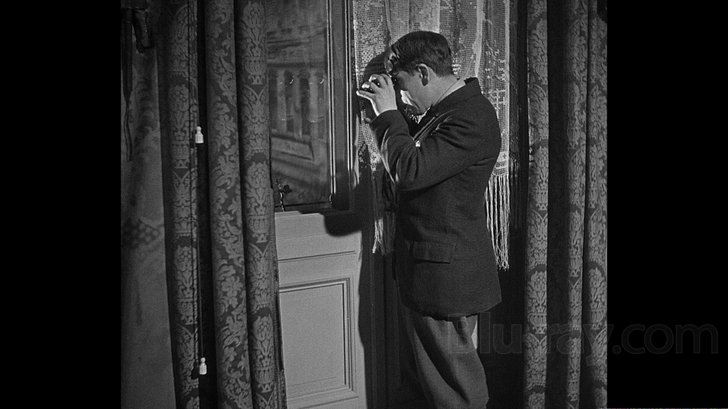
Presented in an aspect ratio of 1.19:1, encoded with MPEG-4 AVC and granted a 1080p transfer, Fritz Lang's M arrives on Blu-ray courtesy of Criterion.
The following text appears in the booklet provided with this Blu-ray disc:
"This high-definition digital transfer was created on a Spirit Datacine from a 35mm fine-grain print made from the restoration negative, which was produced in 2000 by the Netherlands Film Museum, in collaboration with the Bundesarchiv-Filmarchiv, the Cinematheque suisse, KirchMedia, and ZDF/ARTE, with funding from the Mondriaan Foundation.
Thousands of instances of dirt, debris, scratches, splices, warps, jitter, and flicker were manually removed using MTI's DRS system and Pixel Farm's PFClean system, while Digital Vision's DVNR system was used for small dirt, grain, and noise reduction."
This is a strong high-definition transfer, one that would definitely impress those of you who already own or have seen Criterion's SDVD release of M. Fine object detail is very impressive, though, admittedly it fluctuates during different parts of the film. Clarity and contrast levels are also convincing. Obviously, however, there are certain limitations with the transfer that have been inherited from the 35mm fine-grain print, such as scratches, dirt, small cuts, and flecks. The grain structure is intact. Many of the close-ups, for example, look terrific. Additionally, the color-scheme is a lot more convincing than I expected it to be. Finally, blown through a digital projector, the film looks quite impressive. To sum it all up, this is a very strong presentation of a classic film that certainly belongs in every serious film aficionado's library. (Note: This is a Region-A "locked" Blu-ray dsic. Therefore, you must have a native Region-A or Region-Free PS3 or SA in order to access its content).
M Blu-ray Movie, Audio Quality 
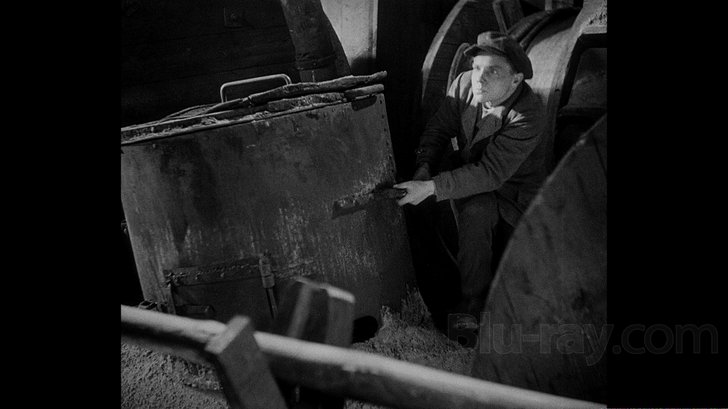
There is only one audio track on this Blu-ray disc for the German version of Fritz Lang's M: German LPCM 1.0. For the record, Criterion have provided optional English subtitles for the main feature.
According to the booklet provided with this Blu-ray disc, the soundtrack was mastered at 24-bit from the original optical soundtrack prints and negatives. As a result, stability is been greatly improved. Generally speaking, the dialog is very easy to follow. There is some inherited mild background noise, but overall I cannot possibly imagine anyone not being satisfied the German LPCM 1.0 track. As expected, the English translation is very strong.
M Blu-ray Movie, Special Features and Extras 
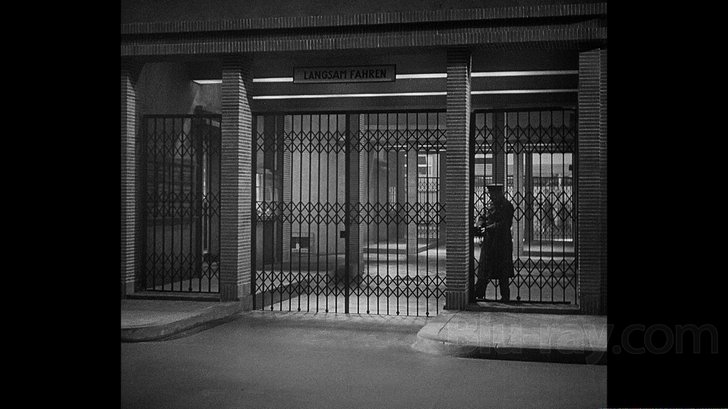
Commentary - recorded exclusively for Criterion in 2004, this commentary features University of California at Berkeley professor Anton Kaes, author of the BFI Film Classics volume on M, and Harvard University professor of German Eric Rentschler, author of The Ministry of Illusion: Nazi Cinema and Its Afterlife. This is a fabulous audio commentary. The film analysis is exceptionally strong, allowing one to gain a clear picture of what Fritz Lang wanted to accomplish with M as well as the complex socio-political conditions in Germany at the time when the film was shot. I strongly recommend that you find the time to listen to the audio commentary.
Conversation with Fritz Lang - director William Friedkin sat with Fritz Lang over the course of two days in 1975 (the year before Lang died) to make this film, which combines artful photography with intimate conversation. Throughout the film Fritz Lang talks about the message of M, its production history, how the Nazis approached him to discuss the possibility of him shooting what would have been propaganda pieces for them, his meeting with Joseph Goebbels, etc. In English, not subtitled. (50 min, 1080i).
A Physical History of M - this documentary traces the "physical history" of Fritz Lang's M, from its production and original distribution to the digital restoration used as the basis for this edition. It includes a look at the French-language version of M but was produced before the discovery of the English-language version, which is also included on this disc. The documentary is very helpful in addressing specific edits the film underwent during the years (and notable differences between the French and German versions of the film). In French, German and English, with optional English subtitles. (26 min, 1080i).
Claude Chabrol's M le maudit - for the television program Cine parade, Claude Chabrol was asked to inaugurate a series of homages to classic cinema by contemporary directors. Chabrol - himself often a director of tense psychosexual thrillers, such as Le boucher and La ceremonie - chose the ur-thriller M. In this, short, a sort of M in ten minutes, Maurice Risch plays Peter Lorre playing Hans Beckert. The piece was originally aired in 1982. In French and German, with optional English subtitles. (11 min, 1080i). In addition to the film, there is also a short interview with Chabrol in which he recall his impressions after seeing M. In French, with optional English subtitles. (7 min, 1080i).
Harold Nebenzal interview - Harold Nebenzal, son of M producer Seymor Nebenzal, sat down with Criterion in August 2004 to discuss his father's pioneering independent company, Nero Films, producer of such films as M, Pandora's Box, The Testament of Dr. Mabuse, Westfront 1918, and The Threepenny Opera. Nebenzal himself worked on his father's 1951 Hollywood remake of M, as well as Cabaret, and is the creator of the award-winning novel Cafe Berlin. In English, not subtitled. (15 min, 1080i).
Paul Falkenberg's Classroom Tapes - in 1976 and 1977, M editor Paul Falkenberg was asked to address film studies classes at the New School in New York. Here, there are audio excerpts from the discussions between Falkenberg and the the students. In English, not subtitled. (37 min, 1080p).
Stills gallery - a collection of production stills, behind-the-scenes photos, and production sketches by art director Emil Hasler. Promo materials are also included.
English version - the English version of M, which was discovered in the BFI archives in 2005 by German film scholars Robert Fischer and Hans-Michael Bock. Not subtitled. (93 min, 1080i).
Booklet - a 34-page illustrated booklet containing Stanley Kauffmann's essay "The Mark of M"; Fritz Lang's "My Film M: A Factual Report"; Gabriele Tergit's "Fritz Lang's M: Filmed Sadism"; an article published unsigned in Film-Journal, a German independent film-industry trade paper, on May 10, 1931, the day before M opened; and "Fritz Lang on M: An Interview".
M Blu-ray Movie, Overall Score and Recommendation 
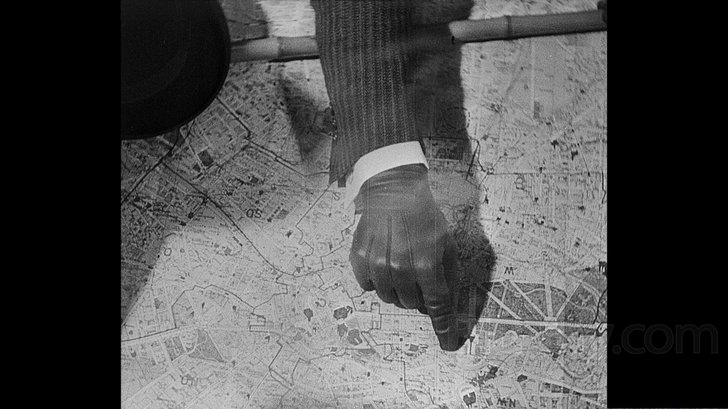
This is a very special release, folks. Not only is the presentation of Fritz Lang's M exceptionally strong, but Criterion's Blu-ray release also contains a variety of terrific supplemental features. If you reside in a Region-A country, I urge you to consider adding M to your libraries as soon as possible. VERY HIGHLY RECOMMENDED.
Similar titles
Similar titles you might also like

Diabolique
Les diaboliques
1955

Revanche
2008

Taxi Driver
40th Anniversary Edition
1976

The 400 Blows
Les quatre cents coups
1959

The Offence
1973

The Magician
Ansiktet
1958

Bigger Than Life
1956

Gomorrah
Gomorra
2008

The Conformist
Il Conformista | 4K Restoration
1970

Vivre sa vie
Vivre sa vie: Film en douze tableaux / My Life to Live
1962

Breathless
À bout de souffle
1960

The Night of the Hunter
1955

Repulsion
1965

Funny Games
1997

Bullhead
Rundskop
2011

Vengeance Is Mine
復讐するは我にあり / Fukushû suru wa ware ni ari
1979

Child of God
2013

Holy Spider
2022

Insomnia
1997

Pierrot le fou
1965